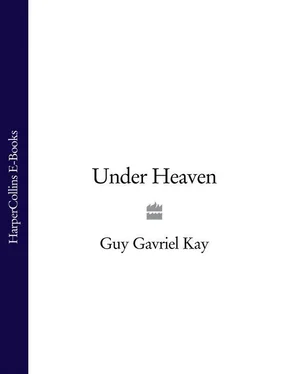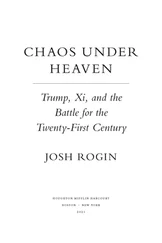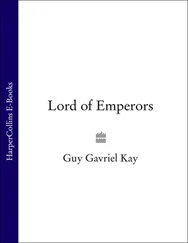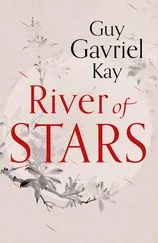1 ...7 8 9 11 12 13 ...32 How far did friendship carry one? Literally, how far?
In the event, he did what he’d been afraid he’d do from the time they’d told him of Tai’s departure. He bade farewell to the family and continued west towards the border, with only the single guard he’d been advised to take with him, back in Xinan.
She had told him it was an easy enough journey, when he mentioned where his friend had gone. Yan didn’t believe her, but the indifferent manner was oddly reassuring.
As long as he paid her, Yan thought, she wouldn’t care. You hired a Kanlin Warrior and they stayed with you until you paid them off. Or didn’t pay them: though that was, invariably, an extremely bad idea.
Wan-si was hopeless as a companion, truth be told, especially for a sociable man who liked to talk, laugh, argue, who enjoyed the sound of his voice declaiming poetry—his own verses or anyone else’s. Yan kept reminding himself that she was simply protection for the road, and skilled hands to assemble their camp at night when they slept outdoors—rather more necessary now than he’d expected at the outset. She was not a friend or an intimate of any kind.
Most certainly not someone to think about bedding at night. He had little doubt what she’d say if he raised that matter, and less doubt she’d break a bone or two if he tried to give effect to the desire that had begun to assail him, aware of her lithe body lying near him under stars, or curving and stretching in her exercise rituals—those elegant, slow movements at sunrise. The Kanlin were fabled for discipline, and for how efficiently they killed when need arose.
Need hadn’t arisen as they’d journeyed down the river road to Shen Tai’s family home. One twilight encounter in light rain with three rough-looking men who might have had theft in mind had they not seen a black-clad Kanlin with two swords and a bow. They’d absented themselves quickly down a path into dripping undergrowth.
Once they started west, however, everything began to feel different for Yan. He was at pains to light candles or burn incense and leave donations at any and all temples to any and all gods from the morning they left the Shen estate and began following a dusty track northwest, and then farther west, towards emptiness.
North of them, parallel to their route, lay the imperial road through the prefecture city of Chenyao, and beyond that was the easternmost section of the Silk Roads, leading from Xinan to Jade Gate and the garrisons in the Kanshu Corridor.
The imperial highway had lively villages and comfortable inns at postal stations all the way along. There would have been good wine, and pretty women. Maybe even some of the yellow-haired dancing girls from Sardia, working in pleasure houses, perhaps on their way to the capital. The ones who could arch their bodies backwards and touch the ground with feet and hands at once—and so elicit arresting images in the mind of an imaginative man.
But Shen Tai wasn’t up there, was he? Nothing so sensible. And it didn’t make sense to go five or six days north to meet the highway, when their own path was to Iron Gate by Kuala Nor, not Jade Gate Pass.
That left his friend Yan, his loyal friend, feeling every hard-boned movement of his small, shaggy horse towards the end of a day’s silent ride through late-spring countryside. He wasn’t going to drink that wine or hear music in those inns, or teach fragrant women how he very much liked to be touched.
It was Wan-si who decided how far they’d ride each day, whether they’d reach a village and negotiate a roof under which to sleep, or camp outside. Yan ached like a grandfather each morning when he woke on dew-damp ground, and the village beds were hardly better.
For anything less than the tidings he was bearing he wouldn’t have done this, he told himself. He simply wouldn’t have, however dear his friend might be to him, whatever parting verses and last embraces they’d exchanged at the Willow Inn by the western gate of Xinan, when Tai had left for home to mourn his father. Yan and Lun and the others had given him broken willow twigs in farewell and to ensure a safe return.
The others? There had been half a dozen of them at the Willow Inn, fabled for the partings it had witnessed. None of the others were with Yan on the road, were they? They’d been happy enough to get drunk when Tai left, and then praise Yan and improvise poems and give out more willow twigs at that same inn yard when he set out two years later, but no one had volunteered to go with him, had they? Not even when the expected journey was only ten days or so, to Tai’s family home.
Hah, thought Chou Yan, many hard days west of that estate. At this point, he decided, he himself could fairly be called heroic, a testament to the depth and virtue of friendship in the glorious Ninth Dynasty. They would have to admit it when he returned, all of them: no more wine-cup jests about softness and indolence. It was too pleasing a thought to keep to himself. He offered it to Wan-si as they rode.
As idle an expenditure of mortal breath and words as there had ever been. Black clothing, black eyes, a stillness like no one he’d ever known, this warrior-woman. It was irritating. A tongue was wasted on her. So was beauty, come to think of it. He couldn’t remember if he’d ever seen her smile.
That night she killed a tiger.
He didn’t even know it until morning when he saw the animal’s body, two arrows in it, at the green edge of a bamboo grove, twenty paces from where they’d slept.
He gaped. Stammered, “Why didn’t…? I didn’t even…”
He was in a sweat, hands shaking. He kept looking at the slain beast and quickly away. The dreadful size of it. Fear made him dizzy. He sat down, on the ground. He saw her walk over and reclaim her arrows. A booted foot on the tiger’s flank, twisting the shafts free.
She’d already packed their bedding and gear on the third horse. Now she mounted up and waited impatiently for him, holding his horse’s reins out for him. He managed to stand, to get up on the horse.
“You never even told me last night!” he said, unable to take his eyes off the tiger now.
“You complain less when you’ve slept a night,” she said, which counted as a long sentence. She started off, the sun rising behind them.
They reached the fort at Iron Gate Pass two evenings later.
The commander fed them for two nights (mutton stew and mutton stew), let Chou Yan entertain with gossip from the capital, and sent them west, with advice as to where to spend three nights on the way to Kuala Nor, so as to arrive at the lake in the morning.
Yan was entirely content with this counsel, having no interest at all in encountering ghosts of any kind, let alone angry ones and in the numbers (improbably) reported by the soldiers at the fort. But Wan-si disdained belief in such matters and did not want to spend an unnecessary night in the canyon among mountain cats, she said bluntly. If his friend was alive by the lake, and had been there for two years…
They pushed on through two long, light-headed days (Yan was finding it difficult to deal with the air this high), past the commander’s suggested stopping places. On the third afternoon, with the sun ahead of them, they ascended a last defile between cliffs and came suddenly out of shadows to the edge of a meadow bowl, of a beauty that could break the heart.
And moving forward through tall grass, Chou Yan had finally seen his dear friend standing at the doorway of a small cabin, waiting to greet him, and his soul had been glad beyond any poet’s words, and the long journey came to seem as nothing, in the way of such trials when they are over.
Weary but content, he brought his small horse to a halt in front of the cabin. Shen Tai was in a white tunic for mourning, but his loose trousers and the tunic were sweat- and dirt-stained. He was unshaven, darkened, rough-skinned like a peasant, but he was staring at Yan in flattering disbelief.
Читать дальше












